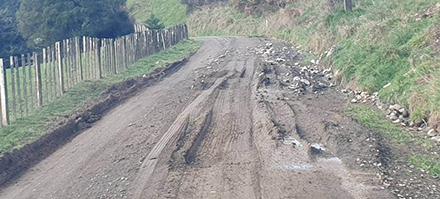
Puniwhakau Rd was one of the worst damaged, and council eventually said it would no longer do any repair work on it. Picture: STRATFORD DISTRICT COUNCIL/SUPPLIED
After reporting a five-year spend of nearly NZ$1.5 million on repairing roads damaged by logging trucks, a Taranaki council is looking to charge forestry owners more to save ratepayers footing the bill. Source: Stuff
The Stratford District Council said costs to repair the unsealed roads in eastern Taranaki during forest harvest has averaged NZ$292,120 a year, seeing other roading projects in the district grind to a halt.
Mayor Neil Volzke said it was an “almost critical situation”, and something needed to be done.
“The funds get sucked from every other project in the roading budgets,” Volzke said.
Last week, at a policy and services committee meeting, Stratford elected members moved to have a new roading targeted rate introduced for “exotic forestry” owners from July 1 to cover the cost of damage caused during harvesting.
The council intends to collect NZ$100,000 annually, and the amount each forestry owner pays towards that is decided by their property’s capital value.
This must be approved at an ordinary meeting of council next month, before going out for public consultation.
NZ Forestry manages around 7000 hectares in the Stratford district, and on Friday company director and Taranaki regional manager, Cameron Eyre, said he already had a lot of questions.
“Council can expect a very large pushback from the forest industry and some serious questions into to their own process if they are going to propose this targeted rate,” Eyre said in an emailed statement.
Eyre said he was uncomfortable commenting fully, without seeing the report himself.
However, he said forestry owners would have questions about the council’s process to work out costs, or whether they were “simply just a passing on of all costs no matter if they are valid or not?”.
“What has the council done with the 25 years of rates forest owners have paid them while the roads are very quiet before harvest?”
At last week’s meeting, mayor Volzke said he knew the move would not be welcomed by forestry owners.
“It’s inevitable what they’re going to say.”
According to council calculations, if the targeted rate is approved, one forestry owner, who owns a 4412 ha block, could see their rates jump from NZ$4036 to NZ$20,500.
But this would also see non-forestry property owners’ roading rates drop.
There are at least 29 exotic forestries in the Stratford district, and they only pay 0.5% or NZ$19,746 – of the total annual roading rates, a report to council said.
An exotic forestry is land that is either in production, or available for planting, but does not include indigenous forests, or protected forests.
In the last financial year, just over NZ$3 million was spent on the maintenance of Stratford roads – which equalled a total of NZ$5064 per kilometre of road.
However, the average spend on unsealed roads damaged by logging trucks is around NZ$20,000 per km, per year.
This is currently funded by a targeted roading rate based on the capital value of all properties within the district, which is then subsidised by Waka Kotahi (New Zealand Transport Agency).
Councillor Grant Boyde, who moved the motion at the meeting to set the annual rate at NZ$100,000, raised concerns about how much extra certain forestry owners would have to pay.
“But we’ve got to have a starting point,” Boyde said. “It isn’t sustainable, ratepayers are paying a huge amount.”
Deputy mayor, and committee chair, Alan Jamieson agreed.
“They need to pay their share,” Jamieson said. “But I think we might get a bit of pushback.”
Most councillors spoke in favour of moving the targeted rate, except Rick Coplestone – calling it “a bit of a bird’s nest really”.
“It’s definitely a no-go,” Coplestone said. “I think we should actually park it – it needs a lot more thought.”
To which Boyde argued against, saying: “Something has to be done.”







